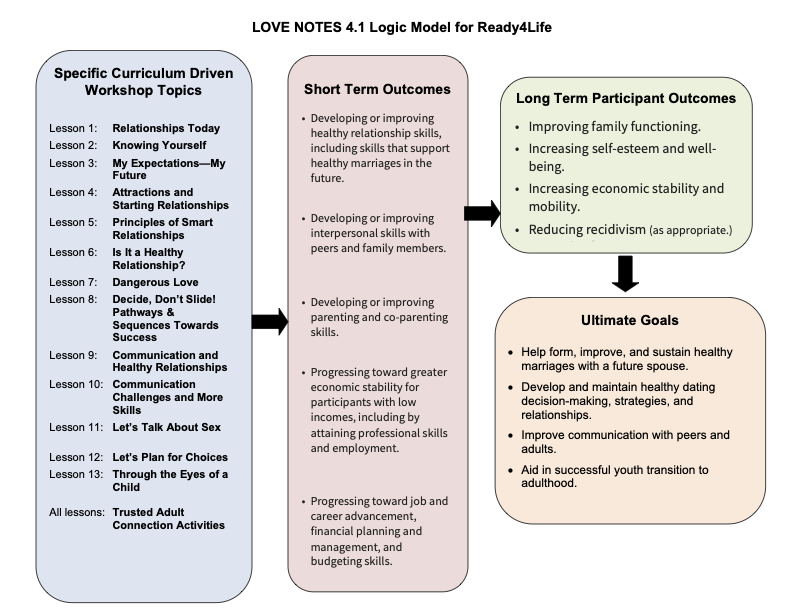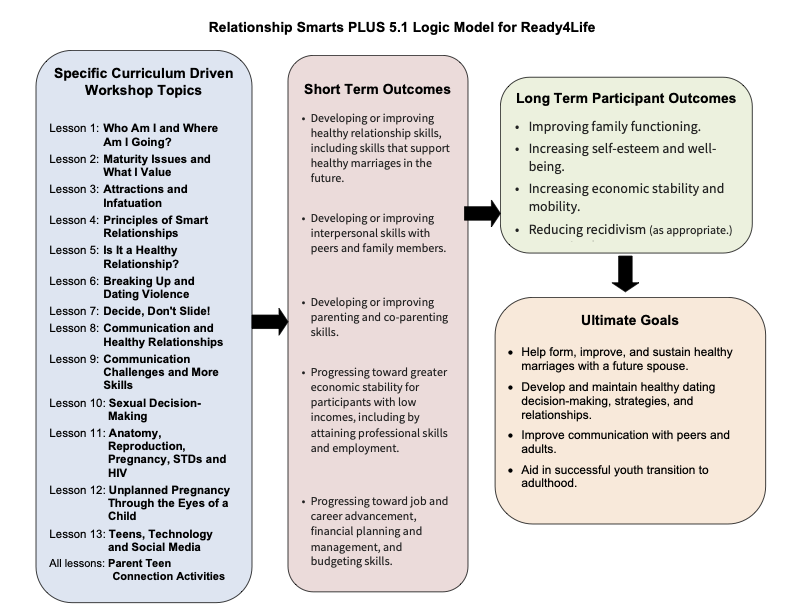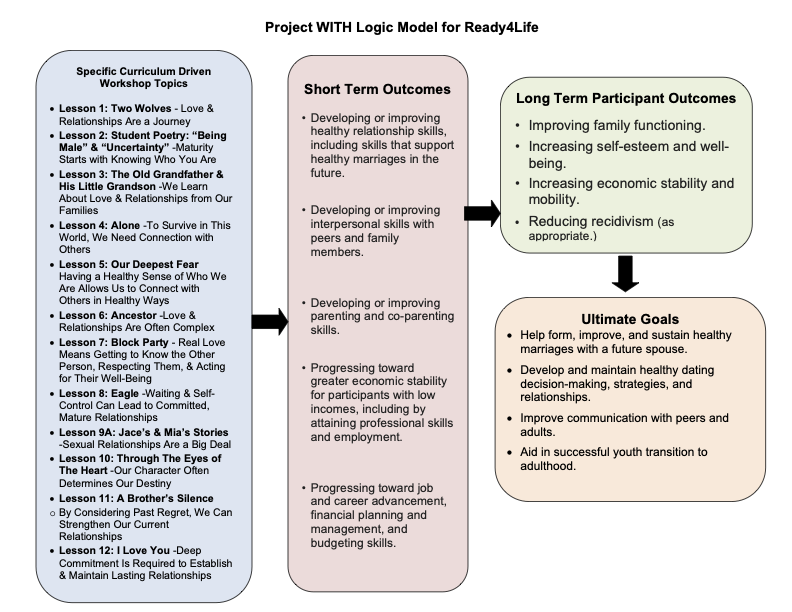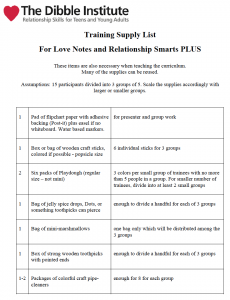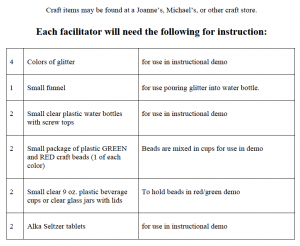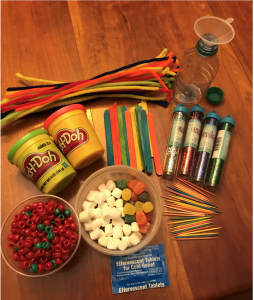The Administration for Children and Families has announced $22M in funding for Relationships, Education, Advancement, and Development for Youth for Life (READY4Life) grants. Deadline is July 29, 2025. Read the full Announcement here. Click on the “Related Documents” button.
READY4Life projects are targeted exclusively to youth, young adults, and young parents ages 14-24 to:
• Help form, improve, and sustain healthy marriages with a future spouse.
• Develop and maintain healthy dating decision-making, strategies, and relationships.
• Improve communication with peers and adults.
• Aid in successful youth transition to adulthood.
The objectives of this funding include:
- Youth understand and differentiate healthy from unhealthy relationships.
- Youth acquire a vision of the kind of relationships they want in the future — including healthy marriages — and take steps to achieve them.
- Youth gain skills and tools that allow them to have healthier relationships today and in the future.
Love Notes, Relationship Smarts PLUS, and Project WITH, will help you successfully meet the grant’s objectives and critical topics.
Plus you will have the entire Dibble team supporting you to make your program a success! Email Grants@DibbleInstitute.org with any grant-related questions.
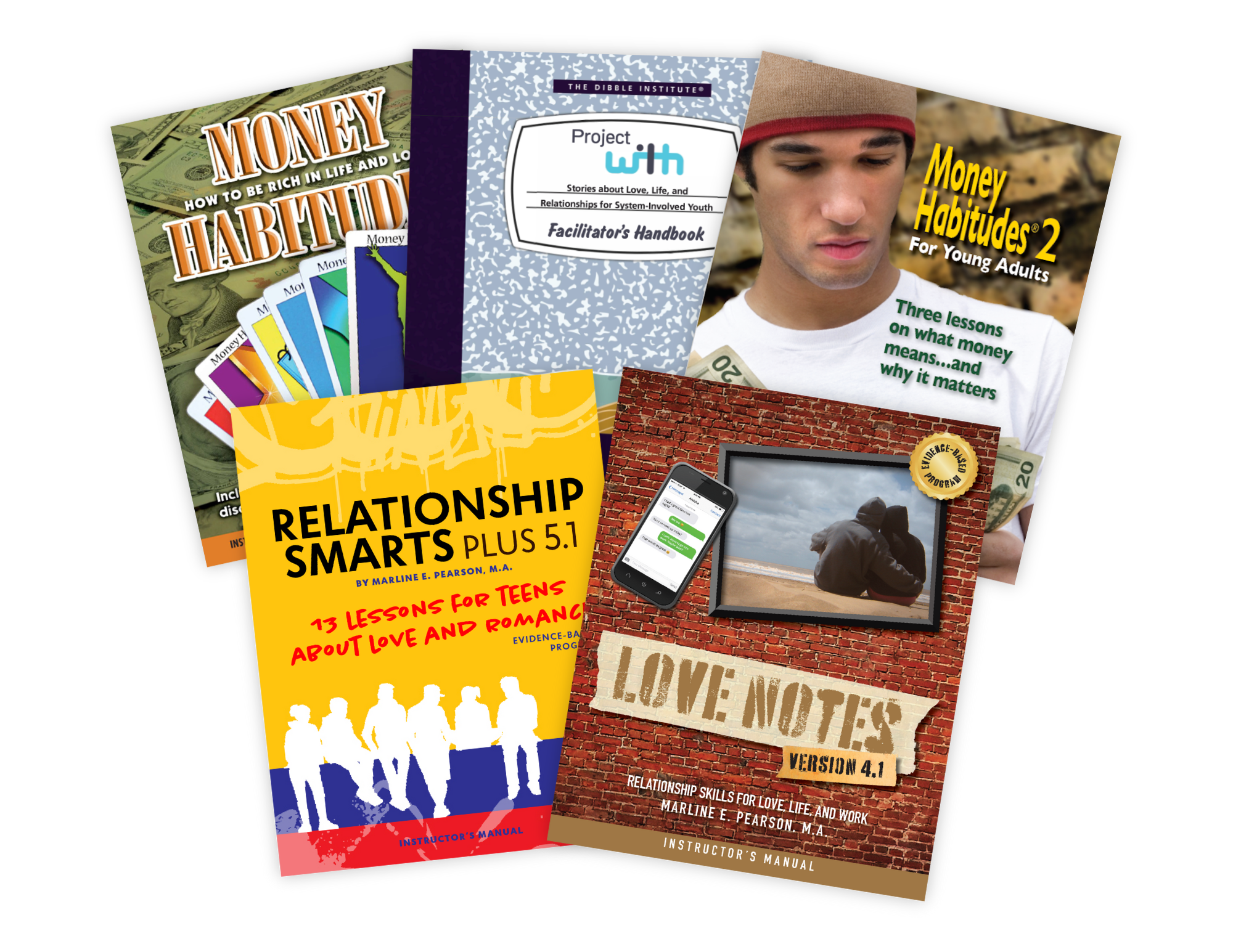
Curriculum Descriptions
Love Notes 4.1: Relationship Skills for Love, Life, and Work
Love Notes covers all three essential focus areas as well as parenting skills for young parents.
For a growing number of young adults (14-24), unplanned pregnancy, single parenting, and troubled relationships derail personal goals. Love Notes, an evidence-based program, was created for this vulnerable audience, including young parents. In 12 hours, they discover—often for the first time—how to make wise choices about relationships, sexuality, pregnancy, partnering, and more. Version 4.1 includes the latest YRBS stats along with existing topics important to today’s youth, including sex trafficking prevention, technology in relationships, navigating relationships in the digital age, online porn, sexual assault, consent—and their impact on relationships.
Rather than focusing on what to avoid, Love Notes builds positive skills and appeals to aspirations. It offers young people new conceptual frameworks, including the Success Sequence, to help them make informed decisions instead of sliding into unplanned choices that can derail their lives.
Love Notes is listed as an Evidence Based Program with the Office of Population Affairs
Relationship Smarts PLUS 5.1 covers all three essential focus areas.
Relationship Smarts PLUS Classic is designed to help teens (14-18) learn how to make wise choices about relationships, dating, partners, sex, and more.
This 12 hour curriculum uses popular media and lively activities to engage both males and females in learning. Key topics include:
- Self-awareness: Personal strengths/weaknesses, past influences, goal setting, friendship, peer pressure, maturity, clarifying values, self-regulation.
- Developing healthy relationships: Attraction, building blocks of positive relationships, how to assess relationships, realistic love, low-risk dating, “deciding vs. sliding.”
- Problems, warnings, and dangerous relationships: Break-ups and broken hearts, unhealthy and abusive behaviors, ways to exit safely, boundaries, dating violence, sexual assault.
- Communication and conflict: Danger signs, time outs, anger regulation, the Speaker-Listener Technique, problem-solving.
- Intimacy and sexual decisions: Pacing relationships, what intimacy means, sex in the context of relationships, boundaries, myths of pregnancy, risky situations, and sexual consent, refusal skills, how unplanned pregnancy affects a child.
- Updates to the Success Sequence: how the order of school, commitment, and babies impacts your future
- Social media: The impact of “constant connection,” sexting realities and risks, online porn, personal polices on using social media.
Its content is delivered through activities that are informative, fun, and affirmative. The student workbook helps teens apply curriculum concepts to their own lives. Parent-Teen activities for each lesson stimulate conversations and connections with trusted adults.
Project WITH: Stories About Love, Life, and Relationships for System-Involved Youths
Project WITH covers all three essential focus areas .
Young people’s skills for forming healthy relationships are shaped by the examples they see and the guidance they receive. When youth become involved with the justice or child welfare systems, their opportunities to learn, cultivate, and practice these skills are interrupted.
Project WITH draws its name from those a person does life “with”—their families, friends, peers, romantic partners, coworkers, and everyone in between. It takes system-involved youth, ages 15-24, on a journey through 12 powerful stories, folktales, and poems. Participants are encouraged to compare the stories with their own experiences, broadening their perspectives and insights. Along the way, youth learn to set goals, recognize the elements of a healthy relationship, and consider the consequences of their decisions before acting.
(Money Habitudes can help you to address optional activity that focuses on financial literacy.)
For most people, spending behaviors reflect unconscious habits and attitudes that were acquired young and persist regardless of financial savvy or economic status. Money Habitudes® explores this phenomenon, and serves as an important, non-technical addition to standard financial literacy programs.
Understanding money is important for all young people. Even basic financial competence can improve their relationships as well as help them attain goals for lifestyle, education, career and family. But technical knowledge about money isn’t enough.
In real life, it is often hidden attitudes that dictate how people actually spend, save and think about money, regardless of financial skills or economic status. Money Habitudes® for Teens and Money Habitudes® for Young Adults focus on exploring this “human side of money.”
For applicants who wish to meet all nine criteria by implementing more than one Dibble curriculum in 12 hours, we can provide guidance for the following:
- Love Notes or Relationship Smarts PLUS or Project WITH – 10 hours (please just select one main curriculum to implement.)
- Money Habitudes – 2 hours
Please email Grants@DibbleInstitute.org for details.
Grant Aids
|
Essential Components |
Love Notes | Relationship Smarts PLUS | Project WITH |
Money Habitudes |
| Communication skills, including expression, discussion, and negotiation skills. |
✓ |
✓ |
✓ |
|
| Conflict resolution, anger management, and problem-solving skills. |
✓ |
✓ |
✓ |
|
| Knowledge of the benefits of marriage. |
✓ |
✓ |
✓ |
|
| Stress and anger management. |
✓ |
✓ |
||
| Intimate partner and teen dating violence. |
✓ |
✓ |
✓ |
|
| Past experiences and its effects on forming healthy relationships (as applicable). |
✓ |
✓ |
✓ |
|
| Financial literacy, such as budgeting, financial planning, and financial management. |
✓ |
|||
| Self-regulation and co-regulation to support healthy relationships and attain personal and community goals. |
✓ |
✓ |
✓ |
|
| Parenting skills (as applicable). |
✓ |
✓ |
Download the Objectives pdf. file here
| Love Notes | Relationship Smarts PLUS | Project WITH | |
OBJECTIVES |
|||
| Youth understand and differentiate healthy from unhealthy relationships. |
✓ |
✓ |
✓ |
| Youth acquire a vision of the kind of relationships they want in the future—including healthy marriages— and take steps to achieve them. | ✓ | ✓ | ✓ |
| Youth gain skills and tools that allow them to have healthier relationships today and in the future |
✓ |
✓ |
✓ |
SHORT TERM OUTCOMES |
|||
| Developing or improving healthy relationship skills, including skills that support healthy marriages in the future. |
✓ |
✓ |
✓ |
| Developing or improving interpersonal skills with peers and family members. |
✓ |
✓ |
✓ |
| Developing or improving parenting and co-parenting skills. |
✓ |
||
Download the Additional Curricula Criteria pdf. file here
| Additional Curricula Criteria | Love Notes | Relationship Smarts PLUS | Project WITH | Money Habitudes |
| Appropriate for high school youth (14-17), as well as young adults ages 18 to 24, and fathers or mothers who are minors |
✓ |
✓ | ✓ |
✓ |
| May be used for both MRES and high school healthy marriage promotion activities. (i.e. taught inside and out of schools) |
✓ |
✓ | ✓ |
✓ |
| Promotes positive relationships, such as youth-partner, youth-parent, youth-child or youth peer |
✓ |
✓ | ✓ |
✓ |
| Covers emotional and social development |
✓ |
✓ | ✓ |
✓ |
| Skills-Based |
✓ |
✓ | ✓ |
✓ |
| Evidence Informed/Evidence Based |
✓ |
✓ | ✓ |
✓ |
| Curriculum based workshop |
✓ |
✓ | ✓ |
✓ |
| Clearly and directly aligned with all NOFO curricula provisions |
✓ |
✓ | ✓ |
✓ |
| Relevant to many. Community contexts and populations |
✓ |
✓ | ✓ |
✓ |
| Staff development and training available |
✓ |
✓ | ✓ |
✓ |
| Technical support provided by the developer to help support implementation fidelity and program success |
✓ |
✓ | ✓ |
✓ |
| In consultation with Dibble, may be adapted to better meet the needs of participants |
✓ |
✓ | ✓ |
✓ |
| All participant materials are in both digital and hard-copy formats |
✓ |
✓ | ✓ |
✓ |
| Fidelity tools available |
✓ |
✓ | ✓ |
✓ |
| Consistent with the principles of the Administration’s Executive Orders |
✓ |
✓ |
✓ |
✓ |
| Teaches participants about preventing child maltreatment throughout childhood |
✓ Lesson 7: Dangerous Love Lesson 13: Through the Eyes of a Child |
✓
Lessons 6: Breaking Up and Dating Violence Lesson 12: Through the Eyes of a Child |
✓ |
Download the fillable Overall Program Logic Model here!
We are hoping that this Logic Model template will make your Ready4Life planning and application process easier.
Notes: DO NOT use this logic model as is. It is meant to be changed and manipulated by you to suit your circumstances and plans.
First go to the Comments Tab (second sheet). There are explanations of what you need to fill in as well as what should stay from the NOFO. Just hover over the cell with a triangle in the upper right to see the comments.
Then go to the “Fill this one in” and fill in the blanks based on the prior page.
This logic model is our best, educated guess as to what you need to complete the application. Ultimately you are the one responsible for the contents of this logic model based on your understanding of the NOFO.
Please email kayreed@dibbleinstitute.org if you have any questions!
All Dibble programs are evidence-informed and many are also evidence based.
You can review the research articles here.
Plan now for your ongoing activity!
The Dibble Institute is pleased to consult with you as you write your grant and after it has been awarded strategies to sustain your activities over time. We have demonstrated over nine years of a federal grant, how to bring relationship education cost-effectively to large numbers of youth by using existing community systems.
We can also help you develop your sustainability plans by identifying alternative funding streams that support relationship education beyond your grant. For instance, Love Notes has been implemented using Rape Prevention Education funding. And, in some jurisdictions Love Notes and Mind Matters are funded for mental health prevention and early intervention.
Please email Kay Reed, Executive Director, at kayreed @ DibbleInstitute.org to set up a time to consult.
Let the world know about your success!
We’d be pleased to invite you to be a speaker at Dibble’s monthly webinar to share your successes, and also what you are learning. Webinar speakers often prepare a Case Study that can be shared with the audience to showcase your program, its high points and its inevitable challenges.
We regularly have 300-400 people from across the country registering for and attending our webinars.
Please feel welcome to write this into your grant application as a dissemination strategy,
The following fidelity aids and checklists are included when you purchase the Love Notes, Relationship Smarts PLUS, or Project WITH:
- Annotated slide deck to focus the instructor on key content.
- Observational fidelity tools for coaches and evaluators
- Knowledge test
- Inventory of related scales that can assess attitudinal and behavioral outcomes regarding sex, relationship quality, communication, conflict, control, violence as well as mediators.
Note: To maintain fidelity, your Love Notes, Relationship Smarts Plus, and Project WITH instructors must be professionally trained by a Dibble Training Specialist or Certified Trainer.
Allowable Adaptations
without Publisher Notification
In the real world, curricula occasionally need to be adapted to meet the needs of the young people being served or the setting where they are being used. Below you will find examples of adaptations that are permitted without consultation with Dibble.
Please feel free to discuss further adaptations you are considering with us by emailing Grants@DibbleInstitute.org
Allowable Adaptations for Love Notes and Relationship Smarts PLUS
- Activities that directly relate to content
- Additional content may be added to the slide presentations deck from the complete Instructor’s Manual based on participant need and available time.
- Include Love Notes activities for expecting and parenting teens.
- Activities that do not relate to the content
- Change the first names in the scenarios to reflect the community served.
- Add icebreakers or energizers at the start of each session or between modules if delivering during an extended period of time.
- Program Delivery
- Deliver lengthened sessions.
- Increase the number and frequency of sessions.
- Teach in-person or online.
- Use exercises, share facts, or make reminders about key concepts as part of booster text or sessions.
- Provide make-up sessions, including pre-recorded lessons.
- May be used with young adults up to age 24.
Unallowable Adaptations
- Delivery without using the Dibble provided PowerPoints and all participant materials, such as the workbooks and in the case of Love Notes, the Colors Personality Inventory.
- Delivery by a facilitator who has not attended a Dibble Certified training.
Evaluator List
In Alphabetical Order
Below is a list of evaluators known to The Dibble Institute for their high-quality work.
You may wish to contact them as you write your Ready4Life grant to learn about their approach, direct and indirect services, and associated costs for inclusion in your grant plans.
Angie Turner Associates – Angie Turner, Ph.D. info@AMTCassociates.com
Arial Moore & Associates – Arial Moore, Ph.D. arial@safehavynn.org
Anita Barbee, Ph.D. anita.barbee@louisville.edu
Becky Antle, Ph.D. becky.antle@louisville.edu
Butler Institute for Families – Shauna Rienks, Ph.D. shauna.rienks@du.edu
CCG – Kim Gregson, Ph.D. kim@collaboratorsconsultinggroup.com
Child Trends – Jennifer Manlove, Ph.D. jmanlove@childtrends.org
Educational Evaluators – Joseph Donnely, Ph.D. joseph@educationalevaluators.com
Evans Evaluation – Matt Evans, Ph.D., matt@evansevaluation.com
Galena Rhodes & Associates – Galena Rhodes, Ph.D., galenarhoades@gmail.com
Insight Evaluation, LLC – Ellen K. Wilson, Ph.D.ellen@insighteval.com
Jean K Elder & Associates, Inc – Jean K Elder, Ph.D. jean@jkelder.com
Midwest Evaluation -Matthew Shepherd Ph.D. mer@midwestevaluation.com
Philliber Research Associates – Randi Burlew, Ph.D. rburlew@philliberresearch.com
Spectrum Research, Evaluation, and Development – Regan Grandy, Ed.D. regan@spectrumred.com
You can download a PDF of the list of evaluators here.
Take a look at these resources to give you background, practical strategies, and tips for developing your grant program.
Webinars
Case Studies
Tip Sheets
Dibble Institute Classroom Teacher Model
Use a proven, effective mini-award program with certified classroom school teachers already teaching in schools!
Why Use the Classroom Teacher Model?
- The classroom teacher model allows the grant dollars to go further and reach more students. Very Cost Effective.
- The classroom teacher model is a great option for an organization with limited staff to provide instruction. The model allows for the grant instruction to be in multiple locations at the same time.
- You are more assured of reaching the 90% completion grant requirement. Teachers can help with retention of students.
Advantages of Classroom Teacher Model:
- Being able to reach many students with a low cost of delivery. A number of factors would impact the cost per student, such as an evaluation and type of evaluation, student/teacher ratio, supports (incentives) provided, grant administration expenses, teacher training, and curriculum.
- Working directly to the decision makers about allowing relationship skills content in the schools. Teachers decide what they want to teach in their courses and have ready access to the administration to support their decisions.
- Allowing you to leverage the state/district content experts to reach multiple teachers.
- Recruiting only interesting, motivated teachers.
- Reaching large numbers of students in schools who will complete the entire program.
- Teaching RE in a course that closely aligns allows for sufficient classroom time to be allotted to the content.
- Allows the teacher to establish the instructional schedule, paying attention to school holidays, testing days, and special events. Each school and/or school district may be slightly different.
- Cost effective instructional costs as teachers are already paid a salary for teaching by the school. They may need to be compensated for their training time as well as collecting pre and post data and any additional data needed for the administration of the grant.
- Increasing program sustainability as the teacher may continue to teach the materials after the grant is over and will still be in the school once the instruction is over if the student has questions or problems and can seek out the teacher; even if it is the next school year.
- Using a teacher already familiar with the students and their individual personalities. The teacher knows how to work with each student and what to expect from them. This one is very important. The rapport with the students is already established. And after the instruction, even the next year, students have been known to seek out the teachers for help with relationship problems.
Want to learn more about how this could work for your grant activity? Call us at 800-695-7975 or write Joanne @DibbleInstitute.org.
Grant Planning
Please call 800-695-7975 x703 for a training quote. You can also email Carlie Kaeppler (Carlie@Dibbleinstitute.org) or Rachel Savasuk-Luxton (Rachel@Dibbleinstitute.org) for a customized quote to fit your training needs.
Staff development, training, and refresher training are required with this funding. It is essential to assure that your instructors deliver Dibble materials with fidelity while meeting the needs of the young people they serve. Our Training Specialists provide a highly interactive, in-depth experience for all Dibble programs.
Benefits of training your staff:
- Enhance grant performance
- Boost speed of grant implementation
- Increase confidence and competence of instructors
- Improve program fidelity
All training clients receive two complimentary hours of Technical Assistance as part of their group training package.
Count on us to be on your team!
In support of the grant requirement that grantees “Use technical support provided by the developer (to help support implementation fidelity),” we are pleased to provide you with a team of experts to help assure the success of your funded program. You may want to budget for 1 hour a month of Dibble TA to support the success of your program.
Our staff will consult with you to develop effective:
- Grant and program implementation approaches,
- Partner and participant recruitment and retention strategies,
- Program adaptations,
- Evaluation plans, and more.
We meet you where you are and deliver these services in a variety of ways – email, ZOOM, conference call, in person – whatever works best for you.
All training clients receive Technical Assistance as part of their training package. We offer two hours of complimentary consultation per organization that have held or attended a Dibble training. Additional consultation is offered on an hourly basis
Download the Fillable Materials and Training Agreement
1 All facilitators and students must have their own sets of materials with the exception of the MH cards, which are reusable.
2 Please note that Love Notes and Relationship Smarts Plus implementation also requires craft supplies that could total up to $200.
3 If your organization has a Dibble Certified Trainer, please call us to create a custom training plan.
The Dibble Institute is pleased to sign an MOU with you as part of your grant application. To get started, please send an email with
1) the number of youth you plan to serve
2) your signed Training and Materials Agreement


